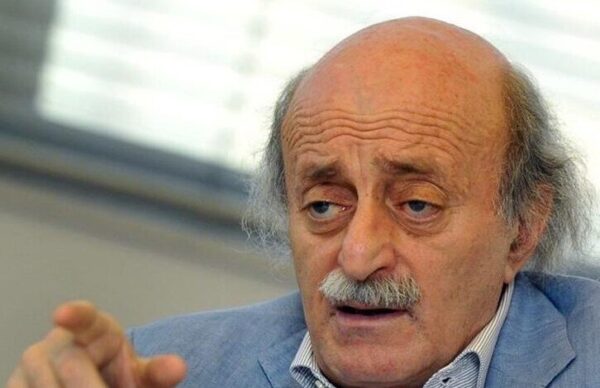By Ali Hussein
Former Progressive Socialist Party leader Walid Jumblatt blasted the result of the latest meeting of the Lebanese presidential mediating group the so-called quintet in New York. “Some are playing with the Lebanese,” Jumblatt told L’Orient-Le Jour newspaper on Wednesday
The mediating quintet which comprises the U.S., France, Saudi Arabia, Qatar, and Egypt met on Tuesday at the U.N. headquarters in New York but failed to issue a statement because of disagreements between its members.
“The quintet has become a quartet,” Jumblatt said, as he accused “some members” of the group of “sabotaging” and “marginalizing” the French envoy to Lebanon Jean-Yves Le Drian’s mission.
“It’s a leap into the unknown,” Jumblatt charged, adding that the presidential crisis is back to square one.
He called on Saudi Arabia to “explain what it wants.” “Things have reached a blatant and unacceptable level,” he said.
In a possible reference to the opposition he said: “This would fuel the ridiculous theories of those who want a vacuum.”
The Saudi-American warning to France and the dissatisfaction with its open-ended initiatives and criticism of one failure after another reportedly prompted them to set a deadline for France to show tangible results or hand over the mediating role to Qatar
It is worth noting that the Saudi-American divergence with France is not new. It dates back to the time of the initial French initiative that promoted Hezbollah and Amal Movement-backed candidate Suleiman Frangieh, a friend of Syrian dictator Bashar al Assad.
Qatar’s “assignment” is for its envoy to carry, this time, an agenda bearing a list of the names of possible “consensus presidential candidates ” On top of the list is Army Commander General Joseph Aoun . Those on the list are candidates that have been proposed as being able to bridge the distance between the “axis of resistance” and the “axis of opposition.”
The French initiative failed
MP Fadi Karam, a member of the “Strong Republic” Parliamentary bloc, confirmed last week that “the French initiative failed (it was accepted by one party) and was not able to convince the other party to accept it.”
“Bit by bit, the axis of resistance is running out of options in Lebanon,” Karam was quoted as saying on the X platform, following the departure of Jean-Yves Le Drian, the French President’s personal envoy. “It has failed in imposing its presidential candidate” and dialogue is its way of trying to reach a settlement.
France is reportedly using unconventional corruption methods to force Lebanese politicians to elect Hezbollah’s candidate.
Jumblatt’s radar needs fixing
One analyst told me “ Jumblatt must have turned off his radar when he criticized Saudi Arabia ”
Veteran Lebanese analyst Rashid Hasan was quoted as saying: “The son of the late statesman Kamal Jomblatt has a sharp political radar and the ability to switch alliances to preserve the Druze community. “
The analyst added: Jumblatt’s radar should by now have clearly figured out that Saudi Arabia is unhappy about the fact that Lebanon is occupied by Iran.
He added: “The election of Franjieh will be an extension of Michel Aoun’s term when Lebanon collapsed as a state and Hezbollah’s mini-state took over the country”.
He added:
“Jumblatt should also by now know that his Civil War friend Nabih Berri is the top obstructor of the presidential election and not the Christian-led opposition and his call for dialogue before the presidential election is unconstitutional .
Lebanon has been without a president since the end of October 2023 when Michel Aoun’s term expired.
The parliament failed in 12 sessions to elect a president, primarily because of the lack of a quorum.
Speaker Nabih Berri a staunch ally of Hezbollah blocked the quorum following every session by making sure that all his allies leave the parliament after the first round.
According to the Lebanese constitution if no candidate secures two-thirds of the parliamentary vote in the first round the parliament should remain in session until the candidate that secures a simple majority of half plus one of the votes gets elected.
During the last session Franjieh secured 51 votes in the first round while the opposition’s candidate Jihad Azour, a former minister and the head of the IMF in the Middle East secured 60 votes but one of his votes went missing. Reports suggested that Berri was behind the missing vote.
Wrong time for a U-turn
Jumblatt was one of the first major leaders to demand the withdrawal of Syrian forces from Lebanon.
He led the protest movement known as the Cedar Revolution, which helped to expel the Syrian regime forces in 2005 after a three-decade presence.

He supported the uprising in Syria in 2011 because it appeared to be capable of bringing down a regime he regarded as detrimental to Lebanon.
At stake is the fate of fading resistance to the dominance of the Iranian and Syrian regime proxies in Lebanon.
Jumblatt has disputed the need for Hezbollah to remain armed. Last year, Jumblatt broke a political taboo by challenging one of Hezbollah’s main justifications for keeping its weapons.
He said the Shebaa Farms, disputed territory occupied by Israel, was Syrian, not Lebanese as Hezbollah claims.
Jumblatt, with support from Sunni leaders, challenged the legality of Hezbollah’s private telecoms network in 2008 which led to Hezbollah’s takeover of the western side of Beirut and to its failed attempt to occupy the Druze heartland of Mount Lebanon.
In 2000, he supported demands led by the Maronite clergy by calling for the withdrawal of Syria’s forces from Lebanon.
At least two Syrian intelligence agents have been nominally wanted by Lebanon’s toothless justice system for decades for the 1977 assassination of his father Kamal Jumblatt.
His father was a monumental figure who championed the Palestinian cause and had no regard for Hafez Al Assad, who had built up proxies to undermine Yasser Arafat, chairman of the Palestine Liberation Organisation.
In conclusion, Jumblatt should by now clearly know who Lebanon’s true friends are. Iran never contributed one cent to the Lebanese government while Saudi Arabia and the Gulf states are the lifeline of Lebanon where half a million Lebanese expatriates are earning their living and supporting their families back home in Lebanon.


Leave a Reply
You must be logged in to post a comment.